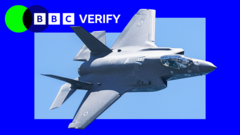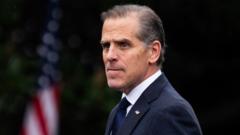In a significant diplomatic engagement, Iranian officials convened with their European counterparts from the UK, Germany, and France to reignite discussions on the contentious nuclear program. This meeting marks the first interaction since the escalation of hostilities, which included attacks from Israel in June, resulting in a 12-day conflict that temporarily halted US-Iran dialogues. The European nations—collectively referred to as the E3—issued an ultimatum to Iran, threatening renewed sanctions by the end of August if tangible progress towards a new nuclear agreement is not achieved.
Iran Engages in Nuclear Negotiations with European Powers Amid Rising Tensions

Iran Engages in Nuclear Negotiations with European Powers Amid Rising Tensions
Iranian diplomats have met with representatives from the UK, Germany, and France to discuss nuclear negotiations for the first time since recent military actions against its nuclear facilities.
Iran’s Deputy Foreign Minister, Kazem Gharibabadi, characterized the discussions as "serious, frank, and detailed," expressing a willingness to continue consultations. However, he asserted that any reimposition of sanctions would be "completely illegal." The background to this negotiation stems from the 2015 Iran nuclear deal, which saw sanctions lifted in exchange for Iran curtailing its nuclear activities, a deal the US exited in 2018 under President Trump's directive.
Tensions escalated further after the US conducted airstrikes against Iranian nuclear sites in response to previous aggressions from Israel. In light of these developments, the E3 remains firm on the need for Iran to limit its nuclear ambitions, putting pressure on them with a sanctioned deadline of October. As the talks commenced, Rafael Grossi, the director general of the International Atomic Energy Agency (IAEA), expressed the necessity for Iran to provide clarity about its nuclear activities and facilities.
In retaliation to the Israel strikes, Iran's parliament had previously suspended cooperation with the UN nuclear watchdog, indicating the fragile state of diplomatic relations. As discussions unfold, Iranian officials hope for a shift in the E3's approach, challenging their prior alignment with US and Israeli strategies while expressing readiness for further engagement towards de-escalation.
Overall, the outcome of these renewed negotiations could significantly impact the geopolitical landscape in the Middle East and redefine global nuclear nonproliferation efforts.
Tensions escalated further after the US conducted airstrikes against Iranian nuclear sites in response to previous aggressions from Israel. In light of these developments, the E3 remains firm on the need for Iran to limit its nuclear ambitions, putting pressure on them with a sanctioned deadline of October. As the talks commenced, Rafael Grossi, the director general of the International Atomic Energy Agency (IAEA), expressed the necessity for Iran to provide clarity about its nuclear activities and facilities.
In retaliation to the Israel strikes, Iran's parliament had previously suspended cooperation with the UN nuclear watchdog, indicating the fragile state of diplomatic relations. As discussions unfold, Iranian officials hope for a shift in the E3's approach, challenging their prior alignment with US and Israeli strategies while expressing readiness for further engagement towards de-escalation.
Overall, the outcome of these renewed negotiations could significantly impact the geopolitical landscape in the Middle East and redefine global nuclear nonproliferation efforts.



















